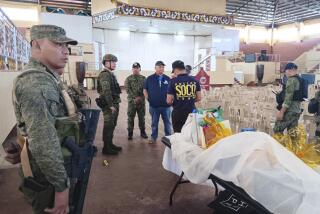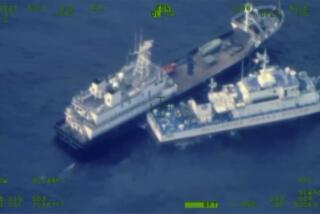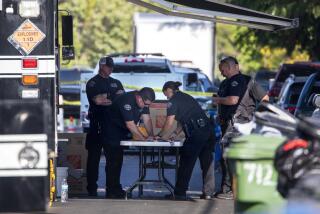Bombing at Philippine Academy Means Aquino Must Get Tougher With Rebels, Ramos Warns
- Share via
MANILA — The Philippine military warned President Corazon Aquino on Wednesday that the bombing at the nation’s prestigious military academy earlier in the day was a brutal message that her civilian government must get tougher in battling the country’s Communist insurgency or face bigger casualties in the future.
Calling the powerful explosion that left four dead and dozens of soldiers and civilians wounded “an act of terrorism,” the armed forces chief of staff, Gen. Fidel V. Ramos, said Aquino’s government should stop handling the insurgency “with kid gloves.”
“Our decision-makers must be very aware and conscious of terrorism of this nature,” Ramos told reporters when informed of the explosion during an impromptu press conference after he parachuted from a C-130 aircraft in what has become the general’s annual birthday ritual.
“It is very clear that they do not discriminate between military and civilians,” he added.
Like Boxer With Hand Tied
In recent months, Ramos has been increasingly critical of the approach of Aquino’s civilian government to solving the insurgency. At one point, he likened the Philippine military to “a boxer in a championship bout fighting with one hand and one leg tied behind his back,” largely because the government was overly concerned about human rights abuses by soldiers.
No longer are the rebels targeting only soldiers, Ramos said, and he indicated that the Aquino administration is mistakenly approaching the insurgency simply as a military problem.
Additional criticism was heaped on the Aquino government Tuesday during testimony before the U.S. Congress by Assistant Defense Secretary Richard L. Armitage, who charged that the Philippine government lacks a comprehensive counterinsurgency policy. Armitage added that the rebels are likely to continue gaining significant ground in their 18-year armed struggle unless Aquino toughens her stand.
Armitage’s testimony was the strongest criticism yet of Aquino’s government by the Reagan Administration, which has staunchly supported the former housewife since she took power from Ferdinand E. Marcos 13 months ago.
Security at Political Rallies
Ramos similarly warned that Wednesday’s bombing could presage an escalation of rebel attacks on civilian government officials. He said he has instructed his 12 regional military commanders nationwide to intensify security at all political rallies during the next two months, the campaign period for upcoming legislative elections.
Philippine Defense Minister Rafael Ileto said Wednesday that the bombing was similar to the 1983 explosion in Rangoon, Burma, that killed four South Korean Cabinet members and a dozen other South Koreans, and one senior military officer investigating the academy incident suggested that the time bomb could have been meant for President Aquino.
The blast at the Philippine Military Academy, this country’s equivalent of West Point, was caused by a powerful explosive connected to a timing device that was planted in the roof of a grandstand where Aquino is scheduled to preside over graduation ceremonies Sunday. There was no indication Wednesday, though, that either Aquino’s appearance or the ceremonies themselves would be canceled.
The explosion, which took place during graduation rehearsal exercises, killed three soldiers and the widow of a government militiaman killed in combat. She was scheduled to receive his posthumous award for bravery during Sunday’s ceremonies.
During his meeting with reporters, Ramos stopped short of blaming the Communist New People’s Army for the bombing.
Blame Communist Rebels
But several military sources at the academy and senior military commanders at armed forces headquarters in Manila said they are already convinced that it was the work of the Communist rebels, who intelligence officials have said were planning to launch a series of attacks in cities and army camps to force the withdrawal of the military from the rebel-dominated countryside.
Even before the Wednesday morning blast, military intelligence officers at the academy, in the northern resort city of Baguio, said New People’s Army assassination squads, known here as sparrow units, had entered Baguio’s city limits in the last week.
The officers said that, in light of the reports, they plan to intensify security at the academy this week in preparation for Aquino’s visit. The officers, who were interviewed before the bombing, expressed the fear that the rebels might try to disrupt Sunday’s ceremony, an occasion that Aquino was hoping to use to improve her ties with the nation’s restive military.
Outsiders Had Access
Yet the camp’s superintendent, Gen. Rudolfo Biazon, told reporters Wednesday that many civilians were present during the bombing at the picturesque camp--one of several tourist destinations in the mountain resort town--and that the camp’s guards have made no attempt to restrict civilian access to the graduation rehearsal grounds in recent days.
Aquino, scheduled to fly to Baguio today to visit the wounded soldiers and civilians, told reporters Wednesday that she still plans to attend the graduation this weekend unless her security advisers decide the risk is too great or military authorities decide to postpone the ceremonies.
There was no indication, however, that security had been tightened at the academy, even after Wednesday’s bombing.
As Gen. Ramos was telling reporters that military authorities were “sweeping, sanitizing and cleansing other areas of the P.M.A. grounds,” reporters at the academy saw only token attempts by entrance guards to restrict civilian access to the academy.
More to Read
Sign up for Essential California
The most important California stories and recommendations in your inbox every morning.
You may occasionally receive promotional content from the Los Angeles Times.













